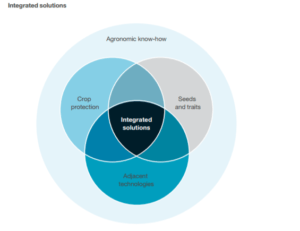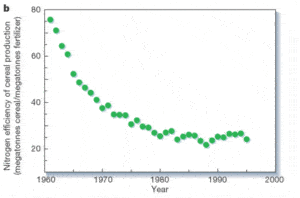Why does Syngenta promote synthetic products that increase air pollution?

Population growth, climate changes and limited natural resources have challenged agricultural production to grow and become more efficient. Despite Syngenta’s efforts in developing integrated solutions to increase productivity, little attention has been given to synthetic fertilizers and herbicides. These chemicals incur in high emissions of nitrous oxide, a greenhouse gas 300 times stronger than carbon dioxide [1]. Would the $54 billion [2] crop protection market opportunity be misleading Syngenta’s priorities?
When things heat up
From 2014 to 2016, the proportion of people who lack regular access to adequate food reduced from 15% to 11%. Despite the improvement, approximately 800 million people still suffer from hunger [3]. In addition, global population is expected to increase to about 8.5 billion by 2030 [4], which will significantly increase global food requirements.
proportion of people who lack regular access to adequate food reduced from 15% to 11%. Despite the improvement, approximately 800 million people still suffer from hunger [3]. In addition, global population is expected to increase to about 8.5 billion by 2030 [4], which will significantly increase global food requirements.
As food demand increases, Syngenta has worked to improve agricultural productivity. However, global warming – caused by the emissions of “greenhouse gases” – has created serious challenges:
- Limited natural resources: water stress is already a limiting factor to productivity; in 2012, it represented about US$40 billion in crop losses due to drought [5]. By 2030, water demand is expected to outstrip supply by 40% [6].

- Climate variability: even though moderate levels of carbon dioxide in the atmosphere may improve some crop yields, if temperature exceeds the optimal level, yields and important nutrients tend to reduce, lowering quality of food [7].
- Extreme weather events: fundamental changes in precipitation or temperature patterns, as well as indirect effects of climate change, such as flooding, salinization or erosion, can decrease productivity and shift production seasons, pest and disease patterns [8].
The food guardian awakens

Syngenta, the global leader in agriculture [9], has committed to attend demand for food, while also protecting the planet’s natural resources. For this, it has stablished a goal of increasing agricultural productivity by 70% in 40 years, using limited natural resources.
Some of the supporting initiatives include: improvement in productivity, through crop protection products, irrigation projects and synthetic nitrogen fertilizer; seeds treatment and hybridization; and biotechnology – also known as “gene technology” or “genetic engineering” [10].
Besides the traditional integrated solutions, in response to the United Nations’ (UN) 17 Sustainable Development Goals (SDGs) announced in 2015 [11], Syngenta created the “Good growth path”. The initiative includes six commitments to be reached until 2020 to help farmers achieve the challenge in a sustainable way [12].
…and protects its motivations
If you read this post until this point, you must be thinking of Syngenta as the heroic company who will save the world from hunger and the world from climate effects. Indeed, these are complex challenges that nobody has yet been able to solve, so Syngenta does deserve credits for taking the first step and pushing the whole supply chain to think about it.
On the other hand, underlying interests might be driving Syngenta to specific actions that help not only crops but also profits to grow. However, is Syngenta really reaching its maximum potential as a company to solve climate change issues? Is it really solving climate change?
Out of the six commitments in the “Good growth path” initiative, for example, 3 are directly related to additional sales to the company. The examples speak by themselves: Commitment #1 is to “Make crops more efficient” and provides farmers with tests of new Syngenta products. Commitment #2 is to “Rescue more farmland” by increasing fertility of 10 million hectares and counts with sales teams building good practices into Syngenta’s offers and testing those with farmers. Finally, commitment #4 “Empower 20 million smallholders” supports farmers to produce more in a sustainable way by bringing them products, know-how and training.
Ultimately, these initiatives will very likely improve performance in a more sustainable way. Is it though a coincidence that 3 out of its 6 commitments are directly related to promotion of Syngenta’s products? Is Syngenta prioritizing its initiatives according to market opportunity?
What could Syngenta do instead?

It is known that intensive high-yield agriculture depends on the usage of fertilizers and herbicides that contain nitrogen acids. Despite increase in yields on its first application, additional applications of nitrogen and phosphorus will not be as effective, due to a diminishing return effect [1].
Besides the loss in efficiency, a study published in Nature explains how Nitrogen fertilization might increase the emission of gases that result in air pollution [13] [14]. In other words, synthetic substances lead to higher yields but also increase air pollution.
If higher productivity in a sustainable way is one key goal for Syngenta, shouldn’t it pursue the development of new herbicides and fertilizers instead of trying to increase their usage across the globe?
This raises a simple question: is Syngenta pursuing the right path for a sustainable future in agriculture or is it trying to maximize its profits while nobody notices this contradiction?



MSaggioro, I particularly enjoyed the contradiction that you raised in your article. In fact, its seems interesting that Syngenta is trying to increase sustainability by promoting its own products and therefore driving their sales and revenue. Historically sustainability has been seen as something that costs the company a lot of money to invest in and that, at the best, could potentially save them some money on energy and water bills. However nowadays companies are seeing sustainability as a driver for profit. So, the question that relies is whether it is ok, or morally correct, to leverage on sustainability. Althought Syngenta is going in the right direction, trying to drive its revenue by their sustainable practices I agree with you that they shouldn’t do that by promoting their own products. Instead, they could adopt some alternative practices that could be more morally correct, like (i) procure more renewable energy for their operations, (ii) put an internal price on carbon for their products so that their customers could be more conscious about it, (iii) implement some land-use practices that conserve natural resources and at the same time can make crops more efficient.
Msaggioro brings up the excellent point, do the motives matter when talking about combating climate change? I would like to think we live in a world in which people want to do good and help one another save the planet. However, we know that companies are driven by profit and they cannot continue to do good if they do not exist. By aligning the sustainability goals to the profit goals of the company I think Syngenta is ensuring everyone in company is working together to make these goals happen. Even if their motives might not be 100% pure, they are helping and in the long run that is what matters.
The part that worries me is that the changes Syngenta are making are slowing down but not combating climate change. I agree with Msaggioro that they should focus on creating new products that help to stop the increase in greenhouse gas emissions. By creating these new products, they can continue to help their bottom line and the environment.
msaggario raises interesting points about the role and contribution that companies like ours play in mitigating the impact of climate change and sustainably feeding the planet without further depleting its natural resources. Indeed, these are surely two of the biggest geo-political challenges our planet will face this century. Any business that operates in parts of the economy impacting climate change and food security must analyze the impact it has and the benefits that its innovation and market presence can bring towards a solution.
As one of the world’s biggest crop protection and seeds companies, we have a particular responsibility and have tried to respond to this through our Good Growth Plan. We fully recognize that this is only a first step and don’t pretend that it solves all the problems. That said, the tools we have built into the Plan are already enabling us to measure input and output efficiency on the farm, including air emissions and nutrient efficiency. This, in turn, is helping to inform the way we develop our products and solutions in order to bring a more sustainable approach to farming.
Our soil conservation programs are proving particularly successful. They offer some of the most effective ways to reduce greenhouse gas emissions from arable cropping and, importantly, boost soil fertility. Through data from the programs, we can already see how modern agriculture technologies – including synthetic pesticides – can be integrated into highly-targeted crop management systems in order to boost sustainability.
It’s true that we create value for Syngenta through these efforts but, we also aim to create value for society at the same time. Given our business, this is clearly one of the primary ways that we can make a substantive contribution to the UN Agenda 2030 and implementation of the Sustainable Development Goals. It’s worth noting that many of our existing Good Growth Plan commitments – such as those relating to biodiversity or our fair labor commitments – are not directly linked to our products. Instead, they are driven more by a responsible approach to doing business in this sector.
Going forward, our intention is to look beyond our existing Good Growth Plan commitments and seek continuous improvement in the sustainability of our entire business. This means reducing our waste, energy and water consumption, and improving fair labor conditions throughout our supply chains. But we are equally sure that it will only be through dialogue and partnerships that we deliver on our existing and future commitments. In this respect, the points raised by msaggioro are welcome: not just in holding us to account but also in provoking different thinking
Dr Juan Gonzalez Valero
Head Public Policy and Sustainably
Syngenta